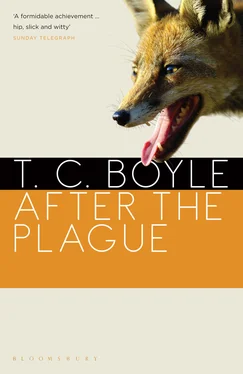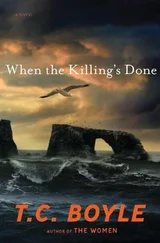It wasn’t Gina seated at the table but a local woman, the proprietress no doubt, totting up figures in a ledger; she raised her head when he walked in, but looked right through him. There were three men at the bar, some sort of police, in black shirts and trousers, one of them wearing dark glasses though there was no practical reason to at this hour. They ignored him and went on smoking and talking quietly, in soft rapping voices. A plastic half-gallon jug of tequila stood before them on the bar, amid a litter of plates and three water glasses half-full of silvery liquid. Lester addressed the bartender. “Margarita rocks,” he said. “With hielo. ”
He sipped his drink, profoundly drunk now, but drunk for a reason. Two reasons. Or three. For one thing, he had pain to kill, physical pain, and for another he was on vacation, and if you can’t be legitimately wasted on your vacation, then when can you be? The third reason was Gina. He’d come so close, and then he’d blown it. Criminal elements. He glanced up at the cops with an idle curiosity that turned sour almost immediately: Where were they when he’d needed them?
And then he noticed something that made his heart skip a beat: the boots. These guys were wearing boots, sharp-toed boots with silver toe-caps, the only boots in town. Nobody in Puerto Escon-dido wore boots. They could barely afford sandals, fishermen who earned their living with a hook and thirty feet of line wrapped round an empty two-liter Pepsi bottle, maids and itinerant merchants, dirt farmers from the hills. Boots? They were as likely to have Armani blazers, silk shirts, and monogrammed boxer shorts. Understanding came down like a hammer. He had to find Gina.
Dusk now, children everywhere, dogs, fishermen up to their chests in the rolling water, bats swooping, sand fleas leaping away from the blind advance of his feet. The steady flow of alcohol had invigorated him — he was feeling no pain, none at all — though he realized he’d have to eat something soon, and clean himself up, especially if he was going to see Gina, because his whole body was seething and rushing, and everything, from the palms to the palapas to the rocks scattered along the shore, seemed to have grown fur. Or fuzz. Peach fuzz.
That was when he stepped in the hole and went down awkwardly on his right side, his face plowing a furrow in the loose sand, and the bad eye, wet with fluid, picking up a fine coating of sharp white granules. But it was no problem, no problem at all. He rolled over and lay on his back a while, laughing softly to himself. Criminal elements, he thought, and he was speaking the thought aloud as people stepped round him in the sand. “Sure, sure. And I’m the Pope in Rome.”
When he finally got back to the hotel courtyard, he hesitated. Just stood there glistening in the muted light like a statue erected in honor of the befuddled tourist. On the one hand, he was struck by the impulse to go back to his room, wash the grit from his body, do something with his hair and fish another shirt out of his bag; on the other, he felt an equally strong urge to poke his head in the bar for a minute — just a minute — to see if Gina was there. Ultimately, it was no contest. There he went, feet thundering on the planks, the sand sparkling all over him as if he’d been dipped in sugar.
There. There was the waitress, giving him an odd look — a blend of hopefulness and horror — and the thicket of heads bent over plates and glasses, the air heavy as water, the bartender looking up sharply. Ever hopeful, Lester lurched out onto the floor.
This time he got lucky: Gina was sitting at a table just round the corner of the bar, the farthest table out on the veranda, her legs crossed at the knee, one shoe dangling from her toes. There was music playing somewhere, a faint hum of it leaking in out of the night, Mexican music, shot full of saccharine trumpets and weeping violins. It was a romantic moment, or it could have been. But Gina didn’t see him coming — she was turned the other way, in profile, the sea crashing behind her, her hair hanging limp to her shoulders — and it wasn’t till he’d rounded the end of the bar that he saw she wasn’t alone. There was a man sitting across from her, a drink in one hand, cigarette in the other. Lester saw a dangle of red hair, muscles under a Lollapalooza T-shirt, the narrow face of an insect.
In the next instant he loomed up on the table, pulled out a chair, and dropped into it with a thump that reverberated the length of the dining room. “Gina, listen,” he said, as if they were right in the middle of a conversation and the man with the insect face didn’t exist, “about last night, and you’re not going to believe this, but it was—”
And then he faltered. Gina’s mouth was hanging open — and this was a mouth that could cushion any blow, a mouth that knew the taste of leather and the shock of the punch that came out of nowhere. “Christ, Les,” she said. “What happened to you — you’re a mess. Have you looked in the mirror?”
He watched her exchange a glance with the man across the table, and then he was talking again, trying to get it out, the night, the way they’d come at him, and they weren’t just your average muggers, they were the law, for Christ’s sake, and how could anybody expect him to defend her from that?
“Les,” she was saying. “Les, I think you’ve had too much to drink.”
“I’m trying to tell you something,” he said, and his own voice sounded strange to him, distant and whining, the voice of a loser, a fat man, a maker of bad guesses and worse decisions.
That was when the red-haired man spoke up, his eyes twitching in his head. “Who is this jerk, anyway?”
Gina — Gina the Puma — gave him a look that was like a left jab. “Shut up, Drew,” she said. And then, turning back to Lester: “Les, this is Drew.” She tried to inject a little air into her voice, though he could see she wasn’t up to it. “Drew wants to know where he can get a good steak around here.”
Drew slouched in his chair. He had nothing to say. Lester looked from Gina to Drew and back again. He was very far gone, he knew that, but still, even through his haze, he was beginning to see something in those two faces that shut him out, that slammed the door with a bang and turned the key in the lock.
He had no right to Gina or this table or this hotel, either. He couldn’t even make it through the first round.
Gina’s voice came to him as if from a great distance—“Les, really, maybe you ought to go and lie down for a while”—and then he was on his feet. He didn’t say “Yes” or “No” or even “See you later”—he just turned away from the table, wove his way through the restaurant, down the stairs and back out into the night.
It was fully dark now, black dark, and the shadows had settled under the skeletons of the trees. He wasn’t thinking about Gina or Drew or even April and the kid in the Suburban. There was no justice, no revenge, no reason — there was just this, just the beach and the night and the criminal elements. And when he got to the place by the lagoon and the stink of decay rose to his nostrils, he went straight for the blackest clot of shadow and the rasping murmur at the center of it. “You!” he shouted, all the air raging in his lungs. “Hey, you!”
They wore each other like a pair of socks. He was at her house, she was at his. Everywhere they went — to the mall, to the game, to movies and shops and the classes that structured their days like a new kind of chronology — their fingers were entwined, their shoulders touching, their hips joined in the slow triumphant sashay of love. He drove her car, slept on the couch in the family room at her parents’ house, played tennis and watched football with her father on the big thirty-six-inch TV in the kitchen. She went shopping with his mother and hers, a triumvirate of tastes, and she would have played tennis with his father, if it came to it, but his father was dead. “I love you,” he told her, because he did, because there was no feeling like this, no triumph, no high — it was like being immortal and unconquerable, like floating. And a hundred times a day she said it too: “I love you. I love you.”
Читать дальше












